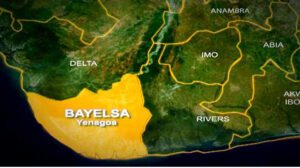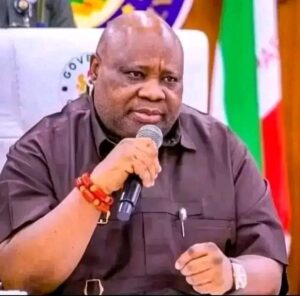Navy reshuffles appointment of 56 Rear Admirals in major shake-up
The Nigerian Navy says it has reshuffled the appointments of some top senior officers comprising 56 Rear Admirals and a Commodore to reinvigorate the service towards efficiency.
The Director of Naval Information, Commodore Adedotun Ayo-Vaughan, made this known in a statement on Thursday in Abuja.
Ayo-Vaughan said the recent shake-up saw Rear Adm. Olusanya Bankole formerly the Director of Logistics, Defence Space Administration, appointed as the Chief of Communications and Information Technology, Naval Headquarters while Rear Adm. Alexander Bingel, formerly Director, Combat Policy and Tactics, now appointed Director of Logistics, Defence Headquarters.
He said Rear Adm. Ibrahim Dewu becomes the Chief of Defence, Civil-Military Cooperation, Defence Headquarters, while Rear Adm. Kennedy Ezete resumes as the Chief of Administration, and Rear Adm. Livingstone Izu becomes new Chief of Logistics.
Other appointments, he mentioned, are Rear Adm. Musa Madugu, now Admiral Superintendent, Naval Ordinance Depot; Rear Adm. Daupreye Matthew appointed Director of Training, Defence Headquarters while Rear Adm. Zakariya Muhammad appointed Chief of Training and Operations.
“Rear Adm. Emmanuel Nmoyem has been reappointed Director, Human Rights Desks at the Defence Headquarters, while Rear Adm. Ibrahim Shettima, formerly Flag Officer Commanding, Central Naval Command, moves to Defence Headquarters as Director of Plans.
“The former Director of Plans, Naval Headquarters, Rear Adm. Monday Unurhiere has been appointed the Chief of Defence Administration, while Rear Adm. Hamza Kaoje, former Director, Equipment Standardisation and Harmonisation, Defence Headquarters has been appointed Group Managing Director, Navy Holdings Limited.
“Rear Adm. Sulaiman El-ladan, erstwhile Chief of Naval Engineering, is now at the Defence Research and Development Bureau at Defence Headquarters as the Director, Marine Research, while Rear Adm. Idi Abbas has been appointed Chief of Naval Safety and Standards,” he said.
According to Ayo-Vaughn, Rear Adm. Mohammed Abdullahi takes over as the Flag Officer Commanding, Western Naval Command, while Rear Adm. Saheed Akinwande formerly the Commandant, Naval War College Nigeria, has been appointed Director, Operations, Naval Headquarters.
Ayo-Vaughan said that Rear Adm. Istifanus Albara had been redeployed from the ECOWAS Maritime Security Coordination Centre, Abidjan to Naval Headquarters as Navy Secretary, while Rear Adm. Clement Atebi, was reappointed to Naval Headquarters as the Director, Audit.
He added that Rear Adm. Samson Bura had become Director of Logistics at the Defence Intelligence Agency, while Rear Adm. Umar Chugali, formerly Director, Cyber at Defence Space Administration, would take over as the Flag Officer Commanding, Central Naval Command.
He explained that those reappointed included Rear Adm. Oluwole Fadeyi, Director, Record Returns and Analysis; Rear Adm. Olusola Oluwagbire was reappointed Flag Officer Commanding, Eastern Naval Command and Rear Adm. Eugenio Ferreira was reappointed Commander, Operation DELTA SAFE.
According to him, Rear Adm. Mustapha Hassan has been redeployed to Naval War College Nigeria, Calabar, as the Commandant, while Rear Adm. Baratuaipri Iyalla has been appointed Flag Officer Commanding, Logistics Command, Oghara.
Ayo-Vaughn added that Rear Adm. Kohath Levi would take over as the Chief of Naval Engineering, while Rear Adm. Bashir Mohammed, former Chief of Logistics, had been appointed as the Director, Project Monitoring, DHQ, and Rear Adm. Julius Nwagu, now appointed Commandant, Defence Intelligence College.
“Meanwhile, Rear Adm. Patrick Nwatu has been reappointed Flag Officer Commanding, Naval Training Command, while Rear Adm. Mike Oamen, who was the Director, Veterans Affairs, Naval Headquarters is now the Chief of Naval Transformation.
“Also, Rear Adm. James Okosun has been reappointed Commandant, Nigerian Navy Engineering College, Sapele; Rear Adm. Ayodeji Olugbode formerly Managing Director, Admiralty Maritime Services Limited, takes over as Hydrographer of the Nigerian Navy.
“While Rear Adm. Abolaji Orederu formerly Director of Ships Design and Acquisition at the Naval Headquarters has been appointed as the Admiral Superintendent, Naval Dockyard Limited, Victoria Island, Lagos.
“The immediate past Commander, Naval Drafting, Rear Adm. Habilla Zakaria resumes to the Headquarters Naval Doctrine Command as the Flag Officer Commanding, while Rear Adm. Suleiman Abdullahi, formerly Managing Director, Navy Exchange Limited, is now the Director of Logistics, Defence Space Administration at the Defence Headquarters.
“The erstwhile Chief of Accounts and Budget, Naval Headquarters, Rear Adm. Kasimu Bushi has been appointed Managing Director, Navy Hotels and Suites Limited, while the immediate past Flag Officer Commanding, Western Naval Command, Rear Adm. Joseph Akpan resumes at the Naval Headquarters as the Chief of Policy and Plans.
“Rear Adm. Abdulmajid Ibrahim has been appointed Director, Defence Transformation; Rear Adm. Olumuyiwa Olotu takes over as the Commandant, National Defence College; while Rear Adm. Ibrahim Shehu is appointed Managing Director, Navy Building and Construction Company Limited, and Rear Adm. Abdullahi Ahmed has been appointed Deputy Chief of Defence, Space Administration.
“Rear Adm Fredrick Damtong resumes as the Admiral Superintendent, Naval Shipyard Limited; Rear Adm. Abdul-Rasheed Haruna has been reappointed as the Chief Staff Officer, Headquarters Eastern Naval Command while Rear Adm. Hamza Ibrahim has been appointed Managing Director, Admiralty Marine Services Limited,” he added.
The Naval Spokesman said that Rear Adm. Sunday Oyegade had been appointed Director, Project Implementation Monitoring and Evaluation, while Rear Adm. John Mamman was reappointed Chief Staff Officer, Headquarters Western Naval Command and Rear Adm. John Okeke was re-appointed Chief Staff Officer, Headquarters Central Naval Command.
He added that Rear Adm. Olatunde Olodude, the former Fleet Commander, Western Fleet would resume at the Naval Headquarters as the Director of Plans, while Rear Adm. Peter Zakaria had been appointed Chief Staff Officer, Headquarters Logistics Command and Rear Adm. Sunday Atakpa reappointed Chief Staff Officer, Headquarters Naval Training Command.
“Rear Adm. Abdul-hamid Baba-Inna is now Director of Administration; Rear Adm. Patrick Effah is now Director of Naval Intelligence and Rear Adm. Abubakar Mustapha assumes office as the Director of Training, Naval Headquarters while Rear Admiral Chidozie Okehie takes over as the Deputy Commandant, Armed Forces Command and Staff College, Jaji.
“Rear Adm. Olusegun Soyemi is appointed Director of Policy while Rear Adm. Abraham Zipelle, formerly Commandant Defence Intelligence College now moves to Naval Headquarters as the Director of Manning.
“Furthermore, Commodore Omotola Olukoya who was the Commander, Central Pay Office resumes as the new Chief of Accounts and Budget, Naval Headquarters,” Ayo-Vaughn said.




